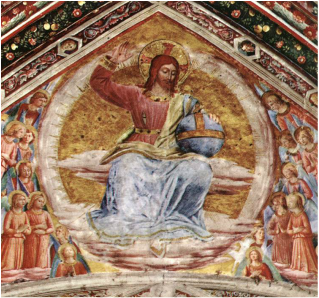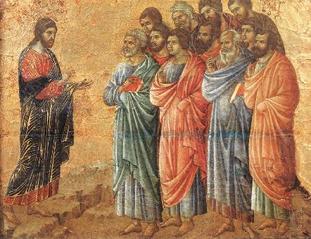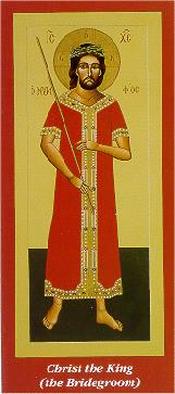 In this final week of the liturgical year we celebrate Christ the King. This feast is important in that we are not only worshiping Jesus as He is, but we are also putting our hope in the promise of His triumphal return at the end of time. In Him all things will be healed, sin forgiven, mercy endowed, justice done, and all things in this heretofore messy world will be perfected. During Advent, the beginning of the new liturgical year, the themes will continue our reflection on this King who comes as a small, vulnerable child. But we never lose sight that what we are really doing is anticipating the triumphant return of Christ the King, the one who will make all things new and wipe away every tear. This feast reminds us that what is here is passing, even fleeting, and that ultimately God is in control. The Scriptures from the past few weeks have pointed us toward thoughts of the Second Coming of Christ. The Old Testament readings are especially important because they describe a time that was deeply disturbing and dangerous for the people of Israel, not unlike the moral, spiritual, and physical dangers of this present time. They had finally attained freedom; the country, once decimated as a result of its own unfaithfulness, was trying to recover. Into this time of rebuilding both nationally and spiritually came the cruel Greek oppressors. The Jewish people were once again tempted to let themselves be stripped of their identity. Greek culture was ‘in vogue,’ and Jewish customs and culture were ‘out.’ To look and act like a Greek was what one did in order to fit in, or so many of the population thought. Some of the younger men even tried to hide the mark of their Jewishness, the sign of the covenant, in order to participate in athletic games which were thoroughly Greek; others co-opted their Jewish tradition in favor of Greek philosophy, even to the point of preferring to speak Greek instead of Hebrew.  However, there were many who were horrified at these trends such as Mattathias who we read about this past week. In the passage we heard Mattathias state unequivocally that he and his sons would serve no king but God. In an attempt to manipulate him the officers of the Greek king told him that he and his family would be given special treatment and gifts if they obeyed the king’s command. These men knew the family of Mattathias was influential and that the Jews of Jerusalem would follow his lead. Mattathias rejected the offer. (See 1 Maccabees 2:15-29) He was faithful and he was also wise. He knew that as a leader in the community it was important to make sure the people had his good example. He knew it was essential to make the message known that there is only one king to obey and that this King is God. A number of years later when the people were still struggling with the influence and oppression of the Greeks, Eleazar, a prominent scribe in the Jewish community, was threatened with death unless he ate the forbidden pork which was sacrificed to the Greek gods. (2 Maccabees 6:18-31) He refused to do so. But because he was well liked, some of the men in charge of the ritual took him aside and urged him to simply pretend to eat the unlawful meat. They said he could provide his own approved meat and substitute it for the pork; no one would know the difference and then he could live. But Eleazar refused because in his heart he knew he would be betraying God by pretending to acquiesce, but also because he would be leading others into sin since they would be watching and following his example. Like Mattathias, Eleazar realized that he was responsible not just for his own actions, but that as a leader his example could either teach correctly or lead others astray. Therefore, he did not waver, choosing to follow his true King, and not the pagan Greek king. He was put to death for his choice, but he inspired others to also remain steadfast in their faith even in the midst of the terrorism of torture by their enemies.  The stories in 1 & 2 Maccabees teach us rather clearly that our words and actions do make a difference. If we are to lead others to God or if we are to be the disciples we say we are, we cannot ‘preach’ one thing and do another. Nor can we co-opt our faith to be politically correct or to simply be in the ‘with it’ crowd. Rather, as disciples we are called to take on the characteristics and values of the King whom we follow. We direct others toward Him by living His teachings and His law of love. It is important that we never lose sight that our King is Jesus so that we do not become unwittingly arrogant as did the people of the Old Testament, thinking that we know a better way than the one He has taught. The ways of the world are seductive and they lead to destruction. The ways of Jesus require discipline and faithfulness, but they lead to eternal life. Christ the King is the King of love and mercy. Coming into the world was an act of great love. Though a King, He chose to be born in humility with no political power, no army, and no wealth. He chose to remain lowly spending His ministry with the poor, marginalized, powerless, sick, outcast, and sinner. His care for his friends and followers, His mercy extended to sinners, and even His compassion toward His enemies revealed His love. However, Jesus never called Himself a king, though once when asked point-blank by Pontius Pilate if He was a king, Jesus implied that He was, saying that that His Kingdom is not of this world. And He did speak clearly about ‘His Kingdom’ numerous times during His ministry. For example, He told parables in which He described what His Kingdom is like: a mustard seed, sown seeds in a field, a pearl of great price, leaven, etc. In other parables He described what the King is like: a sower of seeds; one who throws a great banquet and invites the poor and destitute; a wealthy man who leaves his wealth to servants to aid in its growth; a compassionate and merciful Father who forgives even the worst insults.  What we learn, then, is that if we want to be followers of the King, we need to try to take on His characteristics and make them our own. It should be obvious to others who we follow and whose we are. We need to turn to the gospels to make our decisions, and to pray for wisdom rather than blindly going along with the crowd. We must be mindful that what we do affects those around us, and like it or not, people do watch. Our friends, neighbors, families, co-workers, students, and even strangers do observe us, both consciously and unconsciously. If we act with anger, it becomes acceptable to the other to act in kind, and if we return peace for unkindness, it quenches the fire, disarming the other. If we remain faithful and hopeful for the Kingdom to come, if we act with humility, and try to be merciful, generous, kind, compassionate, and just, if we try to do what is morally right to the best of our knowledge, if we pray and worship in our churches and are not apologetic about doing so, we can affect the world. We do not have to be perfect, but we can let our faith, hope, and love become contagious. In short, if we act like our King, being people of mercy and love, we will indeed be building His Kingdom. The feast of Christ the King teaches us that though we praise and worship Him with the utmost reverence, we are His friends, not merely His subjects. We serve Him because we are loved by Him and we want to respond in love. He is a king with whom we fall in love. He is merciful and just, slow to anger and quick to forgive. He will right all wrongs at the end of time when He returns and He will wipe away every tear, heal every wound, unbind all those imprisoned, and lead us all to the New Jerusalem. Our savior, Jesus Christ, who left Heaven so that He could establish His Kingdom, will come again in glory. Let us wait in joyful hope for His return.  May we be ready for the return of Christ the King, by serving Him in this life through our faith, our hope in His promises, and our love which leads us to solidarity with one another! May we be ever aware that our actions and words influence others, so that we may be intentional in all we do so that we may glorify God and bring others into His Kingdom with us! May we know the love of Christ the King! And may we truly trust that His Kingdom will come as He has promised and that we will live in the peace and joy of being with God forever! Let us continue to meet in the Heart of Christ the King! Peace! ©Michele L. Catanese The top image is a painting called Christ in Majesty by Fra Angelico (1447). It is in the Chapel of San Brizio the cathedral of Orvieto, Italy. The photo which is next is one of mine, taken in Big Bend National Park, Texas. Next is Jesus Teaching by Duccio di Buoninsegna. Next is an icon, Christ the King The Bridegroom by Fr. William Hart McNichols. It can be found at http://fineartamerica.com/featured/christ-the-king-the-bridegroom-066-william-hart-mcnichols.html Finally is another of my photos, a sunset over the Gulf of Mexico, taken in Biloxi, Mississippi. Comments are closed.
|
Heart Speaks to Heart
|

 RSS Feed
RSS Feed

